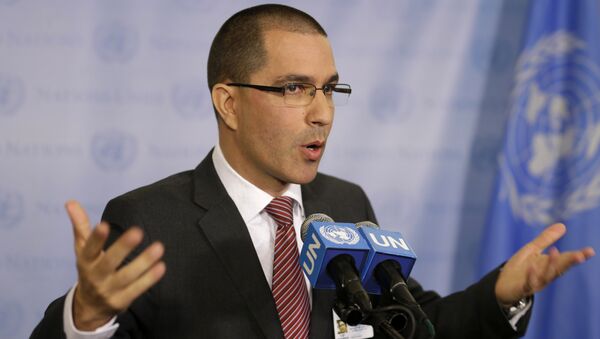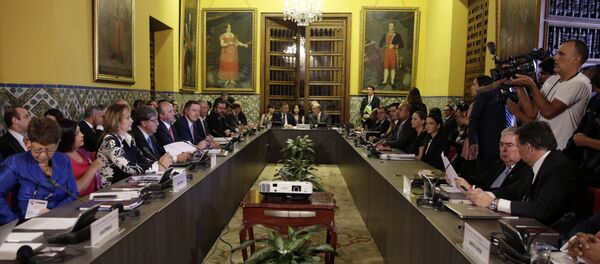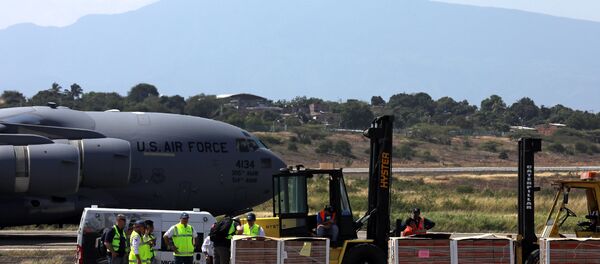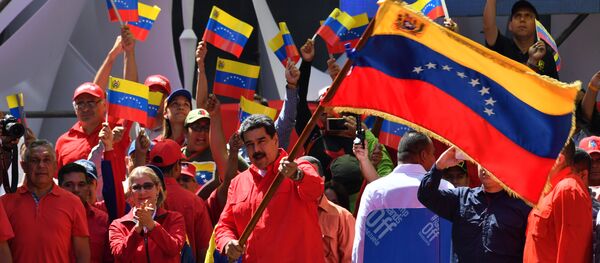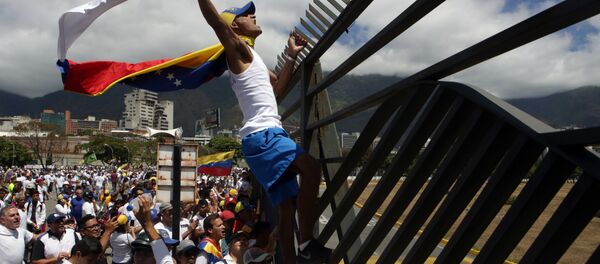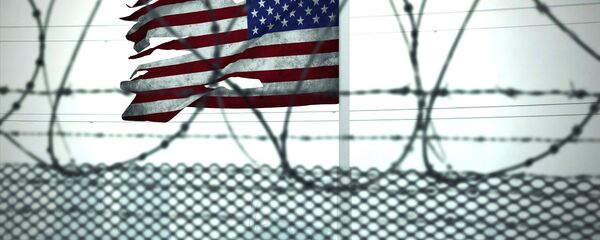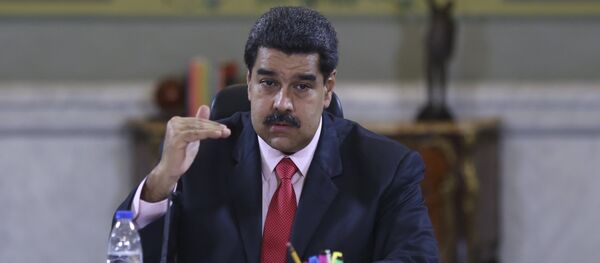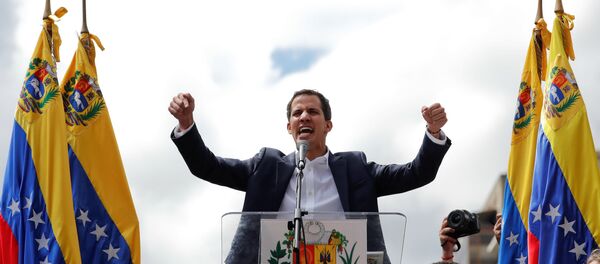On both the Brazilian and Colombian borders, attempts were made to breach the closed border and force entry into Venezuela. While several people died on the Brazilian border, no deaths were reported on the Colombian border. However, dramatic scenes of burning trucks full of goods spread far and wide, even though there is video evidence of the forces accompanying the US aid trucks setting fire to the trucks themselves.
The showdown on the Colombian border, in particular the bridges over the Tachira River separating the two countries, has become a symbol of the entire debacle, in which the US and its allies have recognized the self-declaration of Juan Guaido, a member of the country's parliament, as the interim president of Venezuela and called for the resignation and departure of President Nicolas Maduro, who was elected last May by a very large margin.
Radio Sputnik's Loud and Clear spoke with Venezuelan Foreign Minister Jorge Arreaza in a special and extensive interview about the crisis in Venezuela. In addition to his current role as the country's top diplomat, which he has held since 2017, Arreaza previously served in the cabinet as the Minister in Charge of Education, Science and Technology and was Venezuela's vice president from 2013 to 2016.
"There was a lot of pressure, especially from abroad. International pressure. This is an intervention; it's a coup d'etat that has been attempted against the Venezuelan institutions, and it has been essentially done from Washington, from the White House and the State Department and the Pentagon, and from Colombia. It's a shame our neighboring country, people whom we love, but it is a government that is absolutely subordinated to Washington, and they used Colombian territory to do what they have done in the past."
"This has happened before, not only in Latin America, places like Nicaragua, Dominican Republic, but in other places where, with a disguise of humanitarian aid, what you try to do is to break down the sovereignty of — Venezuela in this case. You are calling the military to rebel against their own government and to break their law and the constitution. This is all a show; this is a spectacle; this is for the mainstream media."
"That's why you saw yesterday: so many medias and journalists in the bridge between Venezuela and Colombia. No one who's really coherent and not insane would really believe that President Trump or [Colombian President Iván Duque Márquez] are concerned about the Venezuelan humble and poor and cannot sleep because the Venezuelans are suffering. That's not Trump — the man of war, the man that loots when they intervene. So what we really have here is another phase of the coup, and it's one of the options, you know. President Trump says that ‘all the options are on the table' — well this was one of the options. And they are looking forward for another kind of intervention, not discarding a military intervention."
Arreaza said the reason both the International Committee of the Red Cross and the United Nations had rejected any participation in the delivery of aid over the weekend because "it's not humanitarian aid. That food and medicine there, we don't even know what was in those boxes. And it's not neutral; it's politicized; it has political objectives; it doesn't have humanitarian objectives. So of course the UN could not participate, and of course even less the Red Cross, because the objective was to open a channel."
"You know this happened in the Dominican Republic in 1965. The government of the US declared a humanitarian crisis in the Dominican Republic. They went to the OAS, the Organization of American States, where they had control of all the governments, and they decided they were going to send humanitarian aid to the Dominican Republic. There was a very important president, left [wing] president in Dominican Republic, Juan Bosch; they didn't like him. There was no humanitarian crisis in the Dominican Republic, so they sent some doctors, some nurses, some boxes of medicine and food — and 8,000 Marines came along. They overthrew President Bosch, and they installed a dictatorship that lasted for several decades. So that's what they are trying to do in Venezuela, and of course, the government of Venezuela has the obligation, the constitutional obligation, to stop this from happening."
"We have a company here, Citgo, which has been stolen from us by this government [in Washington], and it's really a theft, because that's from the Venezuelan state. They confiscated it, like in a communist government, and they blocked our money. But using the company, we used to give humanitarian aid every single time there were natural catastrophes in the south of the US. In Puerto Rico as well, we sent $5 million to Puerto Rico after the hurricane. And we also had a program for the poor in the Bronx, here and in other places of the US, so that they could have their heating oil, they could afford the heating oil during the winter."
"It's always been like this: whenever there is a situation in the Caribbean, the first country that is there to help is Venezuela. When there was the hurricanes in 2017, in Antigua and Barbuda, we managed to land in Barbuda with a Venezuelan military aircraft, and we moved all the population of that island to the other island in between hurricanes. That is the spirit of the Bolivarian revolution: solidarity, that is always in the center."
Arreaza noted that only a couple dozen Venezuelan soldiers, of the armed forces' roughly 200,000 people under arms, had actually defected or abandoned their posts.
Arreaza told Sputnik that Venezuela "was almost a colony of the United States" from the very beginning, and so they see their program of maintaining political and economic independence today as a continuation of the program of Simon Bolivar, a Spanish aristocrat who helped lead the revolutions in Latin America against Spanish colonial rule. Bolivar later served as the first president of Gran Colombia, a country that once included both Venezuela and Colombia as well as Panama, Ecuador and parts of Peru, Brazil, and Guyana. Venezuela declared independence from Gran Colombia in 1830.
"That meant that we had control over our own natural resources, especially oil, and that profit, the rent from the oil, was distributed amongst the poor," Arreaza told Sputnik. "And so, we democratized access to education, which was going to be privatized; we democratized access to housing, to everything; so it's a democratic process in which more and more have access to their own social rights. That is the Bolivarian revolution, and that is why we have such a support in spite of all the economic difficulties and all the international aggressions."
Arreaza said any reports of deaths on the Colombian border were "all fake news. Something happened in the Brazilian-Venezuelan border, and we will have to wait some days to prove that actually those people died in the border. Most of them were killed by bullets that are not used by the armed forces in Venezuela. But everything that happens in Venezuela is maximized, is shown as Maduro's and the government's fault. But it's [only] a matter of time that we can prove how things happened yesterday."
Arreaza described his country's robust democracy, which extends to the grassroots level.
"In the formal sense, we have a very democratic constitution: we have to elect our president, our National Assembly, our mayors, our governors, and then we have a very democratic popular organization, which is the community councils and the communes — las comunas. And there are elections and democratic processes in Venezuela — not every five years or four years, but every single day. And of course, it's a new way of doing democracy, and that is also one of the things that the government of the United States doesn't like, because if you can build a new model of democracy so close to United States, you are threatening the model of capitalistic democracy that you have here in the States."
This isn't the first time the US has tried to overthrow Venezuela's Bolivarian government, either, he said.
"It has been happening. If, here in the US, there is such a concern, because they say the Russians intervened during the election campaign; well we have the intervention of the US government every single day, every single hour, every single minute, since 2001 — at least, 2001. They have been behind all the coups, all the sabotage, the forcing [of] referendums, everything that has happened; all the terrorist attacks in the streets, all the political violence in 2007, 2014 and 2017. This has been funded by the US government. And in spite of that, what we are looking for is for dialogue with the US government. We understand that the real boss here, of the opposition in Venezuela, is not this member of parliament, Guaido; it is Mr. Trump. The best thing that could happen is that we could get together at a high level, maybe our presidents, that could solve many things. Because we know that the ones making the decisions in the case of the opposition — it's not happening in Venezuela, it's happening in Washington. Let's go to the place that we have to go."
Speaking about the attempted coup d'etat in 2002 against President Hugo Chavez, Arreaza told Sputnik, "What they did was, there were videos of the military [members] that rebelled against Comandante Chavez that were recorded in the morning, saying that they condemned the deaths that had happened this afternoon in Caracas, hours before any people died. And we know that snipers were paid by the opposition, by the US; we don't really know which paid them, and that's why there were deaths."
"So this was a coup made for the media… it was done by the media, it was done by the CIA, and it worked for 47 hours, because the people in Venezuela, the poor in Venezuela, never believed that version of the media, they never believed that Comandante Chavez had resigned, and they went to the streets to look for the president. Then 47 hours later, he was president again."
